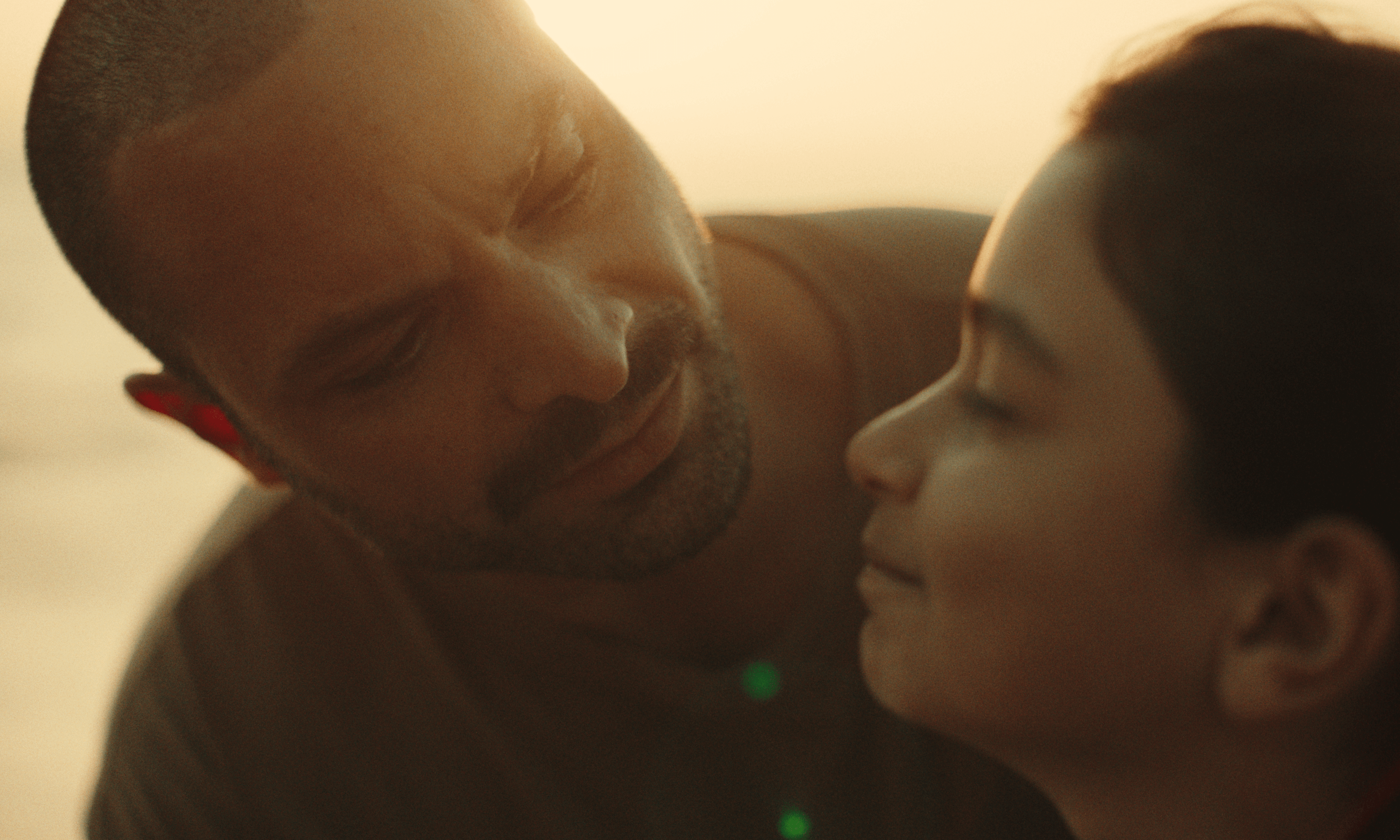
Filmmaker Julia Weisberg Cortés turns personal loss into powerful storytelling with her short film Boyfighter, an intimate yet epic exploration of grief, resilience, and the legacies families carry. Inspired by the loss of her brother and the generational struggles of the men in her bloodline, the film frames pain through hope and connection. Produced through Indeed’s Rising Voices initiative, Boyfighter highlights the power of deeply personal storytelling and the impact of platforms that champion underrepresented voices in film. We spoke with Julia to learn more about the inspiration behind the project, her creative process, and the legacy at its heart.
Boyfighter feels both intimate and epic—rooted in a personal reckoning but with a deep, generational weight. Where did this story come from?
The story of BOYFIGHTER came from a desire to tell a very hard family story, but to frame it around love and hope. I lost my big brother in August 2023 to the same thing that claimed most of the other men in my family. When I really looked at this legacy, I realized it exists in many families. Most of us have that one family story, that trait or legend, spoken about with both affection and caution.
In my family, the men are tough and resilient. I wanted to explore how these legacies—often glorified—can also lead to tragedy, how whole bloodlines can find themselves trapped in cycles that feel impossible to break. In my family, we call it “heroic” as a way to cope with generations of loss.
The film doesn’t shy away from that reality, but it also holds space for the love and meaning that live alongside the pain. That’s what I choose to hold onto as I have faced the drowning weight of grief. And that’s what this film is ultimately about.
You move between timelines in a way that’s fluid but emotionally precise. How did you approach the structure and pacing of the film?
I really have to credit my team for this. Our cinematographer, Matheus Bastos; production designer, Michelle C. Harmon; costume designer, Christine M. Hamilton; makeup artist, Bailey Domke; and editor, Will Mayo, all worked closely together to craft distinct yet fluid timelines.
From the beginning, we wanted each sequence to feel separate in its emotional tone but still subtle enough to blend naturally within the larger story. We weren’t interested in hard shifts like bold supers or dramatic color changes to announce a time jump. Instead, we wanted the timelines to unfold as a kind of discovery.
We invite the audience to investigate and interpret the movement of time for themselves, to challenge linear constructs, and to feel the emotional logic of the film. In the world of BOYFIGHTER, time is more like a circle or a cycle. Diego’s greatest tragedy and his greatest joy are happening simultaneously, each giving him the strength to keep going.
Violence is central to the film—not just physical, but emotional and inherited. What drew you to explore that legacy through this father–son dynamic?
For me, the violence in BOYFIGHTER is a metaphor for struggle—whatever it is you have to overcome or endure to survive. When you grow up in households marked by hardship, it can feel almost impossible to protect your children from it. In my family, it was. There was no clear way to “save” my brother from the legacy he inherited.
That’s not to say cycles can’t be broken. But I also think we need to extend more grace and compassion to ourselves. Just because my brother fell victim to the same struggle as my uncle, grandfather, and cousins doesn’t mean his life was a failure—or that we failed him. The truth is, much of what could have saved him wasn’t in our household. It’s systemic. And that needs to be addressed on a much larger scale.
I chose the world of fighting to explore this idea because we’re living in a time when people are fighting every day—to survive, to feed their families, to find joy amidst pain. Fighting felt like the most universal metaphor. And pairing that with father and son felt most authentic to my brother’s story.
But BOYFIGHTER isn’t just about my family or my own loss. It’s about our collective grief, our shared struggle as a species, as a planet. Violence and struggle exist—they always will—but so do our love and the memories that bind us to each other and give us the courage to carry on.
So much of your work focuses on the overlooked stories of Mexican-American women. How did it feel to pivot to a story centered around men, while still channeling your core themes?
It was an exciting challenge. BOYFIGHTER was the first film I made that fully depended on a male-centered worldview. The violence was deeply masculine, and the father–son relationship was rooted in a very paternal dynamic, both of which felt somewhat foreign to me. But from the start, I knew I wanted to explore the gentler, more vulnerable side of these themes.
Michael Mando pushed into a kind of emotional openness that went against the stereotypes of how a father should grieve or how he should show love to his son. It was deeply moving to watch his process, which was definitely exploratory and very different from the female-driven stories I’ve told in the past.
I know some people might say there’s no real difference between telling a male- or female-centered story, and maybe for some, that’s true. But this one felt different—or at least the access point did. It demanded I grow alongside it, and it was transformative in ways I didn’t expect.
Your personal and cultural history clearly fuels your storytelling. How do you honor your family’s legacy while creating something wholly your own?
I’ll admit nothing is “wholly” my own. I continue to be moved and inspired by not just my own family but everything else all around me.
I’m driven by a desire to tell the stories of the people in my family who never had the chance to be heard. I don’t say that in some savior way or as if I’m undoing generations of trauma; the truth is, the work they did was far more sacrificial and admirable than anything I do. But deep down, I know they had dreams that never made it past their wildest imaginations.
I believe they’d be proud to see me pursuing mine and even prouder to know that so much of my work is devoted to capturing the undying spirit that runs through our bloodline. I’m proud of the stories that shaped my family tree and ultimately led me to this moment.
I take these personal stories and merge them with my own curiosities and the larger world. In doing so, I’ve found something powerful: we’re far more alike than we realize. That’s the heart of my work—to reflect that truth.
What was it like being part of the Rising Voices initiative? How did that support system impact your creative process and career outlook?
I think anytime people invest in your work and uplift your voice, it’s a priceless gift. Having the support of the Rising Voices initiative meant everything to me. It came at a time when I was grieving my brother, and it gave me the opportunity to create something in his honor and then share it with a wide audience. That kind of support felt like a hug from God—or the universe—a reminder that there’s purpose in all of this and that my brother is still with me in some way.
Ultimately, what I believe the team at Rising Voices took away from the BOYFIGHTER script was the depth of grief I poured into the page. It showed me that people and companies still value real, personal stories. It’s not just about what’s commercial—it’s about the stories that speak to the heart and connect us universally.
Rising Voices gave me a platform to tell a painful story in a very honest way, and most of all, to share my brothers—Richie and Greg—with the world. I am, and always will be, deeply grateful.
What are you currently working on, and how does Boyfighter inform or influence your next steps as a filmmaker?
I don’t want to jinx myself, but I’m hoping BOYFIGHTER will be my last short film for a while. It’s my fourth short, and I finally feel ready to take that next step into the world of features. I’m actively developing BOYFIGHTER into a full-length film. I’m also working on two other features, one of which I hope to shoot in Scotland. Outside of the indie film space, I also work in television and am hopeful that something will be greenlit soon.
Whether it’s TV or film, all the stories I write carry the same core themes: love, loss, identity, legacy, and resilience. Those are the threads that continue to guide me, and I’m excited for what comes next.
For other filmmakers navigating cultural duality or generational wounds, what helps you stay rooted in your voice?
Remember where you come from. Whether that’s a place of pride or fear, let it drive you toward creating the stories that fulfill you. And above all, always take courage.
Photo Credits: MVA Films








